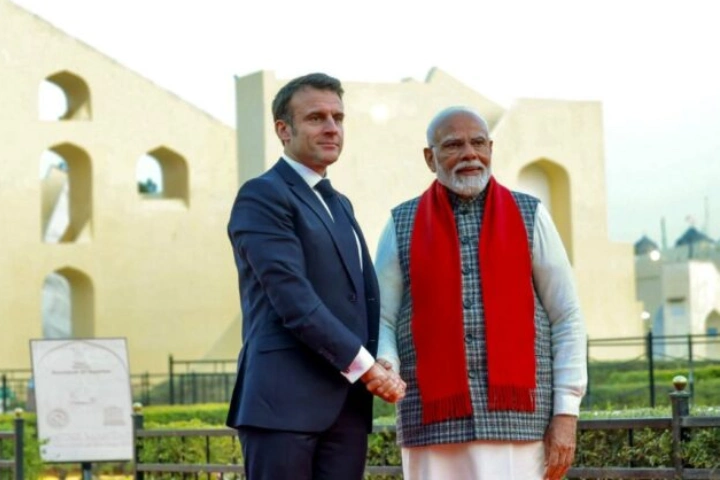

Prime Minister Narendra Modi, French President Emmanuel Macron
“It’s not very often that two leaders are successively guests of honour at each other’s national day. Also, this is the 6th time a French leader has come for India’s national day.”
That was Foreign Secretary Vinay Kwatra briefing the media on President Emmanuel Macron’s visit. He also noted that Modi and Macron had met six times last year and four times before that. Such it seems are the bonds that bring together India and France. But sentiments aside, there were key outcomes from this visit.
The defence industrial roadmap is moving forward, but as Javed Ashraf, India’s Ambassador to France pointed out, “We are looking for not just manufacturing and Transfer of Technology, which keeps you going with the same crutches you have been going on for last few decades, but work in the actual design phase, metallurgical phase etc. So Safran is willing to do it with 100% technology transfer including design, development, certification to production. But it’s a complex subject and has to fit in with future requirements.”
A defence space partnership MoU was signed between India’s New Space and Arianespace for launches. Here the focus is on space situational awareness, collision avoidance, earth monitoring, remote sensing, communications and broadcasting.
Among other notable takeaways was the Tata-Airbus industrial deal to build the H125 helicopter in India, joint research in clean energy especially decarbonization of hydrogen, use of AI in healthcare with the focus on 2026 as the Year of India France Innovation, and the decks cleared for the Indian consulate in Marseille to open along with a French office in Hyderabad.
There was a question on the delay in finalising the agreement on building French nuclear reactors in India.
Kwatra said that “There are several elements of the nuclear partnership that need to be kept in mind, technical and engineering elements, for instance, elements relating to putting in place a financing mechanism, issues about localization on which EDF (Electricite de France) and India’s Nuclear Power Corporation are working on together. So, both entities have been trying to move forward on these issues and a lot of progress has been made.”
He emphasised that financial viability and cost effectiveness were issues being worked on. He said the two sides were working “with strong strategic commitment”.
As for the Small Modular Reactor (SMR), he said India has its own “strong SMR programme, so viability matters, also what its position would be in the energy mix.”
(The story is being republished courtesy StratNews Global)
India decisively asserted its military superiority over Pakistan during this month's brief but intense conflict,…
Trade associations and local business groups in Pakistan-occupied Gilgit-Baltistan (PoGB) launched an indefinite protest on…
A human chain and protest march was organized by various organizations in front of the…
The United States on Saturday announced the expansion of its security partnerships with India through…
Highlighting the use of indigenous platforms during Operation Sindoor, Chief of Defence Staff (CDS) General…
Congress MP Shashi Tharoor on Friday (local time) said that Colombia will issue a statement…